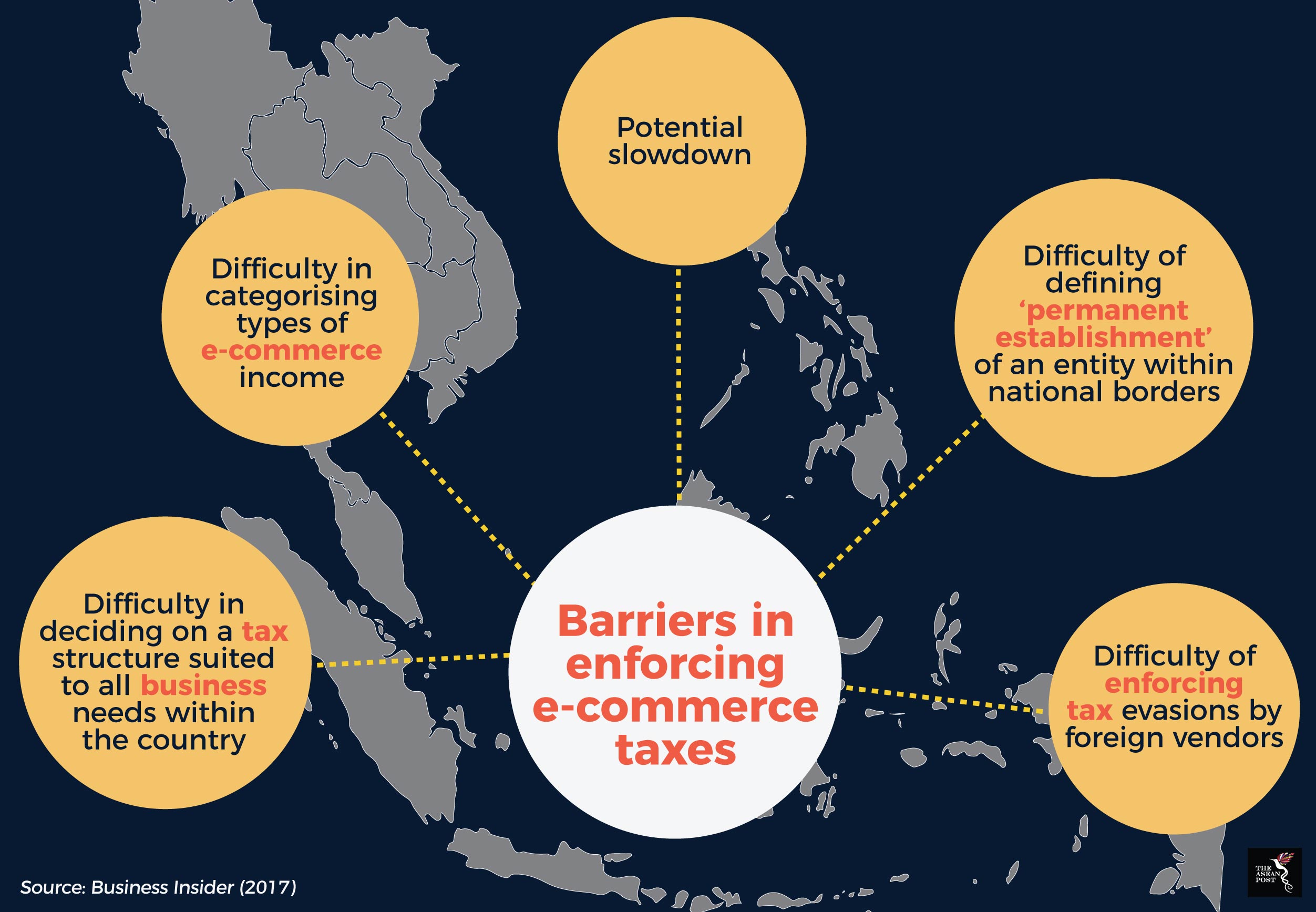We outlined in Part 1 how e-commerce taxes are likely to affect the Southeast nations of Singapore, Thailand, Indonesia and Malaysia. Since e-commerce is transnational by nature, a few technical issues also surface when redefining conventional taxation laws to suit a more international context. It is, however, possible to look at what different jurisdictions have done so far.
In Southeast Asia, it is Singapore which seems the most poised to introduce e-commerce taxes, yet at the same time also sees it as something it would rather not rush into. Indranee Rajah, the Minister of State for Law & Finance said in a recent radio interview with Singapore’s MoneyFM 89.3 that e-commerce taxes were something Singapore was still studying as it required careful implementation.
One approach Singapore could take to taxing e-commerce transactions is to tax foreign e-commerce players on the same level as local ones, according to The Straits Times in February 2018. Malaysia and Thailand are considering similar approaches to taxing e-commerce. Some changes to current taxation laws would be the first step towards this.
“You can imagine, 20 years from now, the way people purchase is going to be very different and by that time online platforms will be mainstays, so if that’s not part of the tax regime, there’s going to be a lot of holes there,” Indranee Rajah told Bloomberg in 2017.
“Tax rules have traditionally been drafted along the lines of physical presence and nexus, which may not be able to deal adequately with e-commerce transactions that are carried out virtually,” Chia Seng Chai, a Tax Services Partner of Ernst & Young Solutions in Singapore told Today Online in November 2017.

Expanding the scope of current taxation laws would require re-definition of some conventional taxation terms. Two were separate issues that needed to be addressed, according to Simon Woodside, head of e-commerce at the Fiscal Affairs Division of the Organisation for Economic Cooperation & Development (OECD). For direct taxation purposes, the concept of ‘permanent establishment’ was important in order to clarify how states had the right to tax the profits of businesses set up in another state. For indirect taxation - which includes value-added taxes (VAT) - the issues include how to take into account items like returns of goods and seller discounts.
According to financial education website Investopedia, VAT is defined as a type of consumption tax that is placed on a product whenever value is added at a stage of production as well as the point of sale. Meanwhile, indirect taxes are taxes made payable to the government, but which are in fact passed on to the consumer in the form of the final price of goods or services.
The ‘permanent establishment’ issue arises since the inherently borderless nature of e-commerce allows businesses to participate in multiple transactions with customers in different countries without ever having a physical presence there. According to Woodside, since the supplier essentially operates outside the jurisdiction of the state where the goods are being received, it is difficult, in practice, to enforce tax collections unless there is a trusted third party involved in the tax calculation, or a simplified registration system for foreign suppliers.
“The whole point of a definition of PE is to set a threshold so that companies do not have to file multiple returns for relatively minor activities in other states,” noted Catherine Robins of international law firm Pinsent Masons, referring to the imposition of e-commerce taxes in the context of the European Union.
“If the EU is to go ahead, with these proposals, they should set a high minimum turnover limit for activities in each state – if they fail to do this, compliance burdens and cross-border tax disputes will increase significantly,” she continued.
Currently, Singapore imposes indirect taxes on consumers by taxing purchases worth more than S$400, but does not yet impose direct taxes on e-commerce providers. Even so, it is considering removing the S$400 cap, in light of how many online transactions simply fall through the net, resulting in lower tax revenue collections overall.
In the United Kingdom, e-commerce taxes are applicable so long as the business is centrally managed and controlled from the UK and does not take into account foreign e-commerce businesses that merely conduct transactions there.
In terms of indirect taxation, tax lawmakers would also need to consider how to structure e-commerce taxes around goods returns and discounts. In terms of discounts, one issue that could arise is when sellers on e-commerce sites are still taxed on the full price of their goods sold, even when they offer discounts, and buyers pay less.
The difficulty facing governments, essentially, is how to tax e-commerce in a way that benefits it, taking into account the risks of non-compliance. For example, some e-commerce companies, like Amazon, may include the cost of VAT into the pricing of their goods, but these taxes may be avoided by overseas advertisers collecting revenue from locally registered sites. Attempts to clamp down on these would be difficult since they are not ‘permanently established’ within the country of operation.
Since the tax needs of each country is different, there is no uniform, “one-size fits all” approach. How effective a tax regime is will only play out when it is actually implemented. The only questions, perhaps, are when and how exactly to do so.
Recommended stories:
